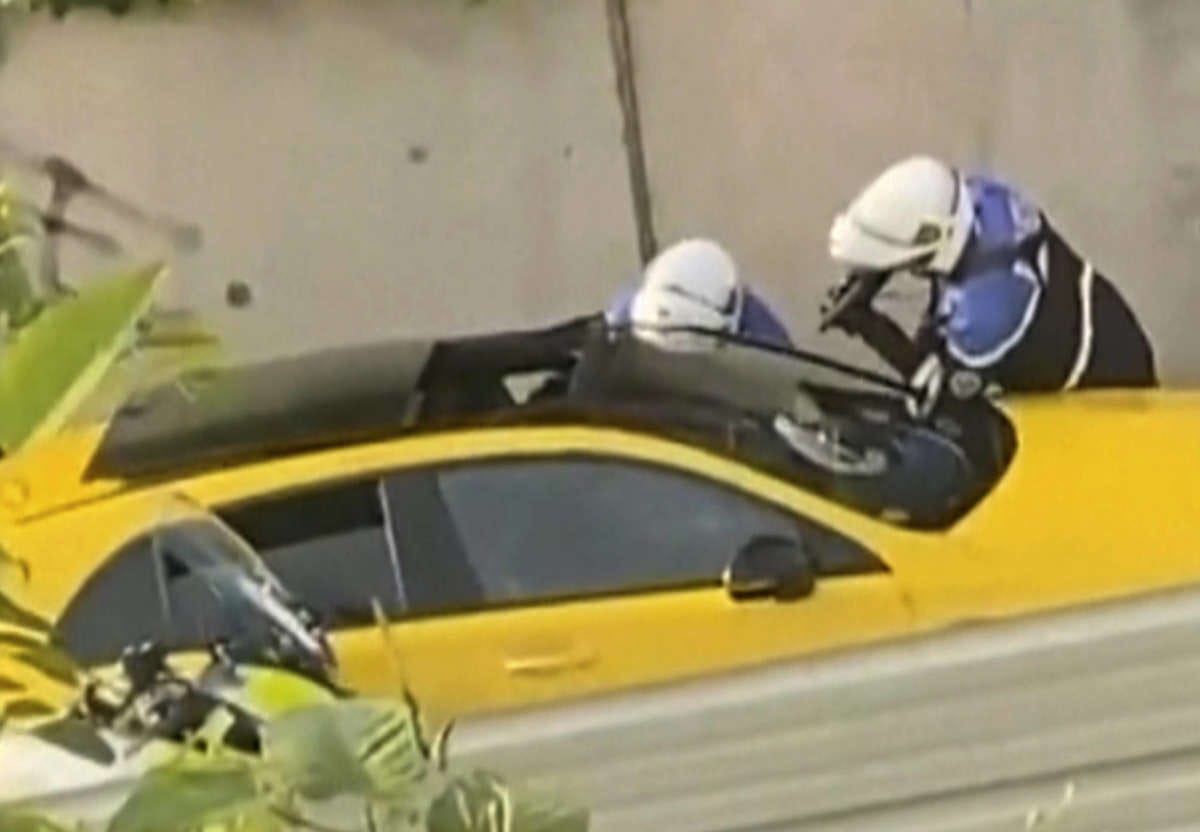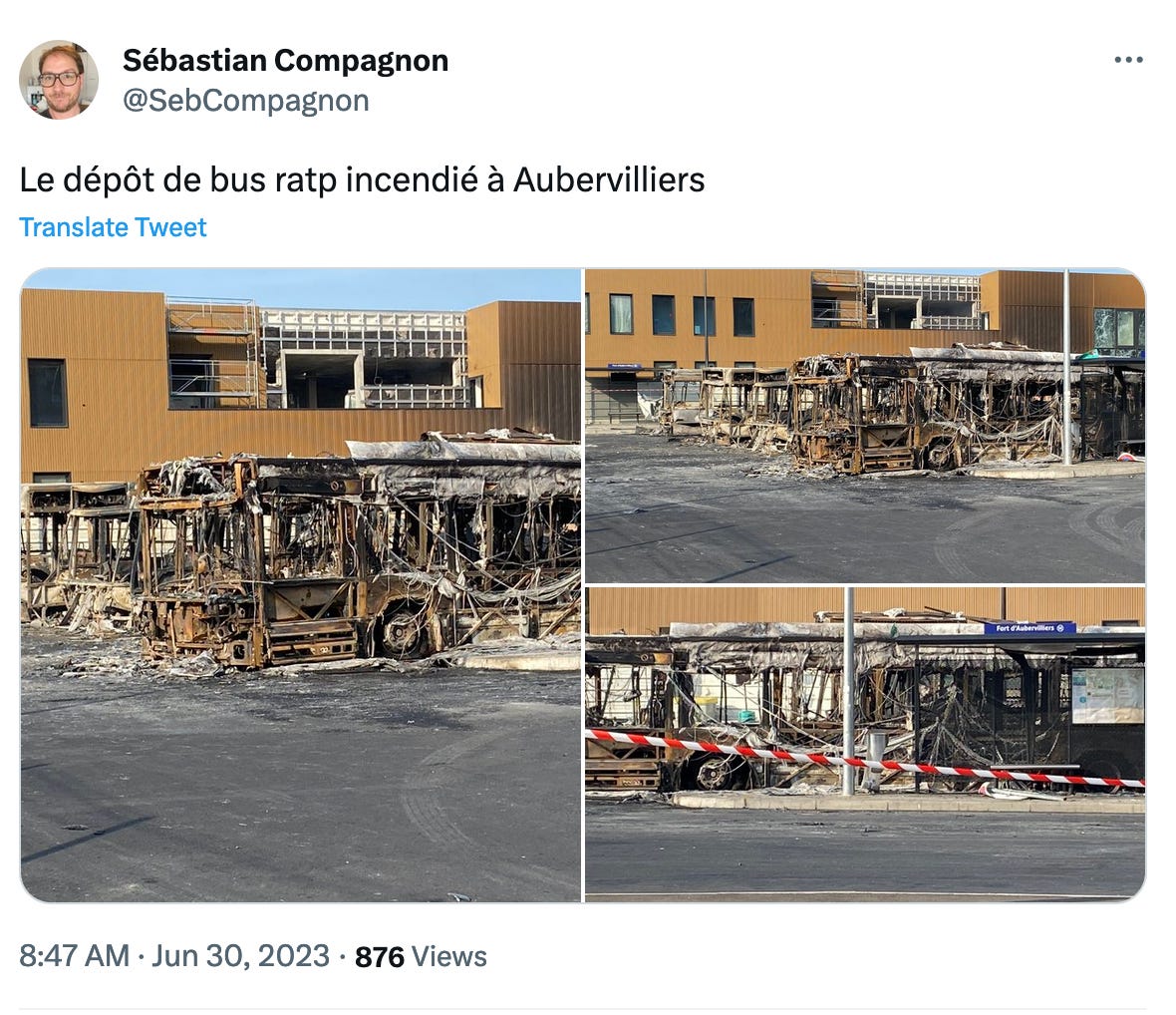Having A Riot In France
Another police killing of a teenager touches off another wave of protests
In April 2020, Disney+ launched in France. The streaming platform was 6 years behind Netflix which had already proved immensely popular with French consumers.
Disney urgently needed to target French viewers, but not just for branding and marketing reasons. French law requires that a certain percentage of content on any broadcast or streaming platform be produced in France.
So Disney had to quickly establish itself as a producer of French content. The House of Mouse started with a relatively safe family comedy in late 2021, followed by a YA fantasy series in early 2022.
For its third production, Disney made a bold and risky choice. In May 2022, Disney+ debuted its first French production: “Oussekine.”
It is a powerful show. Written and directed by one of the people behind French spy series Le Bureau des légendes, the 4-part mini-series is based on the true story of Malik Oussekine, a French-Algerian teenager who stumbled into a student protest on the evening of December 6, 1986, and was chased by police and clubbed to death.
Stop Me If You’ve Heard This One Before…
The students had been protesting university tuition fee increases. Police were trying to crack down and Oussekine became the casualty. He was taken to the hospital by ambulance where he was pronounced dead.
Initially, French prosecutors — with a straight face — determined that Oussekine did not die from his wounds, but rather from a heart attack. Still, protests began and these evolved into riots that were further inflamed by a revelation that shocked no one: The police lied.
Oussekine had died at the scene of the beating, rather than at the hospital later. In January 1990, two policemen who beat him to death were charged but only received suspended sentences.
Watching the show offers a sad commentary in light of events last week: This has all happened before. And it will all happen again.
Wash. Rinse. Repeat.
The story of Oussekine proved to not be not extraordinary, but rather a template for a French story that gets a periodic reboot.
There were widespread protests and riots following the 2005 death of 2 Muslim teenagers who were electrocuted in a power substation while hiding from police who claimed they were thieves (they weren’t). There were protests following the death in police custody of 24-year-old Adama Traoré in 2016. And there was an outcry in 2022 when 4 police officers beat a black music producer, but were only reprimanded after a viral video revealed their actions.
All of this brings us to the images that have been filling newspapers and televisions around the world.
Last Tuesday, Nahel M., 17, was stopped by police and shot as he tried to drive away. Initially, police and prosecutors claimed he was driving dangerously and refused to stop. But a video emerged that contradicted their version of events and showed him stopped with two police officers standing at the side of the car with guns pointed at him and firing from point-blank range as he drives off.
Over the past 18 months, 17 people have been shot by police for allegedly refusing to stop their cars. Naturally, young men whose origins are African are stopped by police in France at a higher rate than white men. This has led to long-standing complaints from these communities about police racism.
As anti-racism activist Rokhaya Diallo wrote in The Guardian:
The numbers of cases of police brutality grow relentlessly every year. In France, according to the Defender of Rights, young men perceived to be black or of north African origin are 20 times more likely to be subjected to police identity checks than the rest of the population. The same institution denounced the absence of any appeal against being checked as a form of systemic police discrimination. Why would we not feel scared of the police?
But to even suggest institutional or state racism in France is a taboo subject, an attack on the universalist ideals that are at the heart of the nation. Everyone is equal. Race is an American construct. And so the central issue becomes impossible to admit, let alone address.
Following the images of the shooting, politicians across the spectrum generally condemned the actions of the officers. The police officer who pulled the trigger was arrested and charged by French prosecutors with voluntary homicide, an unusually swift action that prompted condemnation by police unions and far-right politicians. A right-wing commentator set up a GoFundMe campaign to support the officer which has raised more than €1 million.
"Tonight, my client has gone to prison for having fired a shot he thought was necessary, with the weapon given to him by the government to ensure his safety and that of citizens," attorney Maurent-Franck Liénard told Le Monde.
It did little to calm the storm.
‘France Is On Fire’
Protests began the evening of the shooting in Nanterre, the western Paris suburb where the shooting occurred. From there, they spread across the country to several other major cities, including Marseille and Toulouse.
As often happens, the subsequent protests have become the story, rather than police violence or the deplorable conditions and lack of economic prospects that people of color and immigrants living in the banlieues.
The depiction of such events across social media and by the international press can be confounding to people actually living here. I’ve gotten many texts, emails, and WhatsApp messages over the past week asking if I’m okay and if our family is safe. (Yes, we’re fine).
That’s because headlines like “France is on Fire” in the New York Times or “French cities are in flames over systemic racism” in the Washington Post paint an exaggerated picture that would lead one to believe that the entire nation is engaged in an uprising and that the government is on the verge of being toppled. Harrison Stetler in the NY Times refers to “a countrywide revolt over police violence and racism.”
Well, no. The nation is not in flames. And yet to offer some kind of perspective risks sounding like one is trying to minimize what is happening.
What is happening is indeed alarming. At least 220 towns and cities have reported some kind of damage: 210 schools have suffered either fires or some other damages forcing them to close; the government mobilized an additional 45,000 police officers over the weekend; 1,000 buildings have been burned or looted; some cities suspended or limited public transportation services; officials canceled some high-profile concerts at major arenas; 3,200 people have been arrested in connection with protests, rioting, or looting; someone set a car on fire and rammed it into the home of a mayor of a small town east of Paris; someone set fire to a library in a low-income neighborhood in the eastern town of Metz causing about €12 million in damage; the French government promised €20 million to cities to repair broken surveillance cameras; president Macron canceled a planned trip to Germany; public transportation has been targeted by rioters:
On Monday, news came that a 24-year-old firefighter died while battling a fire started in an underground garage in Saint-Denis, just north of Paris. The news was announced by France’s Interior Minister, leading many to assume the fires were linked to protestors, but the fire fighter’s association said that had not been determined.
That latter tragedy overshadowed the fact that arrests and looting seemed to be significantly lower on Sunday as Nahel’s family, activists, and some politicians called for calm. Nahel’s grandmother appeared on TV asking for the violence to stop.
“Stop rioting, stop destroying,” she said on BFMTV. “I say this to those who are rioting: do not smash windows, attack schools and buses. Stop. It’s mothers who take those buses.”
Meanwhile, politicians are trying to stake out their positions. Politicos on the far right are calling for crackdowns against rioting hoodlums while stoking anti-immigration sentiments, while the left is highlighting the long-simmering anger over the lack of justice for people of color (and consequently being condemned for indirectly encouraging the rioters).
Macron singled out social media and video games for inciting young people and appealed to parents to be, well, better parents.
"It's the responsibility of parents to keep them at home," he said, according to AFP. "It's not the state's job to act in their place…Platforms and networks are playing a major role in the events of recent days…We've seen them -- Snapchat, TikTok, and several others -- serve as places where violent gatherings have been organized, but there's also a form of mimicry of the violence which for some young people leads them to lose touch with reality.”
Macron plans to meet this week with mayors from towns that have seen some kind of rioting. The government seems mainly focused on the question of restoring order and punishing those arrested for rioting. According to reports, the government seems a bit stunned that many of those participating in the protests and violence are under 17 years old.
It is an uprising of the young as much as it is of the dispossessed (though there is likely a strong intersection in this case). For a president who once projected a youthful aura but eventually came to find his constituency was among the 60+ crowd, he is not quite sure how to respond. There is talk of a national address and eventually a visit to some of the neighborhoods.
But in terms of new policy initiatives?
"There have already been movements to make political demands, sometimes marches marred by violence, but contained violence," said Olivier Véran, the government spokesperson, on France Inter radio. "There's no political message here. When you loot a Foot Locker, Lacoste or Sephora store, there's no political message. It's looting."
Of course, there is the usual furrowing of brows and handwringing over France’s inability to support people living in the banlieues. More money will likely be allocated eventually for various programs, but that has had little impact in the past. There seems to be little political will to admit or address the larger institutional and structural economic and social problems in France.
And so this moment will likely pass. Until it starts all over again.
Chris O’Brien
Le Pecq



